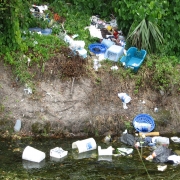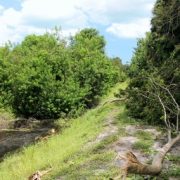Drainage Canals Are Not Dump Sites
Dumping, throwing, discarding, placing, depositing or disposing of vegetative debris or other trash in the Lake Worth Drainage District (LWDD) canals or along the rights-of-way is illegal. Under the “Florida Litter Law” (Link: Florida Statute 403.413), dumping material on public or private property is punishable by fine and potential jail time. For example, dumping in excess of 15 pounds, but less than 500 pounds for noncommercial purposes is a first-degree misdemeanor and is punishable up to a $1,000 fine and imprisonment of one year. As the weight and volume of the material increases so do the penalties.
Within LWDD’s service area, illegally dumped items are largely non-hazardous solid wastes that are inconvenient or costly to dispose of properly. Typical litter items include household trash, furniture, appliances, tires, and vegetative debris from lawn maintenance and tree trimming. Dumping offenders most often include residents, construction and landscape contractors, waste removers and automobile and tire repair shops.
Some of the negative effects of illegal dumping can impact public safety, the surrounding environment, and the local economy. For example, using a drainage canal as a dump site can reduce the flood control capacity of the canal and threaten the health and safety of residents. Additionally, trash dumped on the canal right-of-way can impede access needed for regular maintenance or emergency response during severe weather. While landfills are designed to prevent waste from leaching into the ground or adjacent waterbody, this is not true for illegal dumping which can harm local areas. Finally, dumping is an eyesore that negatively affects surrounding property values and governments must redirect resources to clean-up materials and provide pollution mediation.
If you witness an illegal dumping incident in progress, call your local law enforcement agency or 911. Catching dumpers in the act is the best way for police to apprehend dumpers and deter future violations. Never confront someone who is dumping. Instead, try to get the vehicle license number or description of the vehicle used to commit the crime. Most importantly, share this information with your neighbors and encourage them to always dispose of trash properly. For more information on the proper disposal of trash visit Palm Beach County Solid Waste website. (Link: www.swa.org/408/For-Residents).



